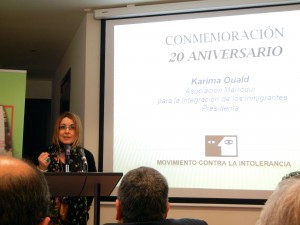On our last day in Spain, while Claire and Orli talked with Mariam, Fallon and I sat in on a Spanish class at the Asociación Marroqui, which helps to integrate immigrants into the Málaga community. The class consisted three Moroccan women, one Ukranian man, and one teacher, who was a Spanish man. He told us that he lives in Málaga and volunteers at the center. Classes meet twice a week for an hour and a half and three different levels of Spanish are offered. The class we were sitting in on was the most basic level. These individuals had very little Spanish, if really any at all.
They were working on very basic worksheets which reminded me of those that I would be assigned when I began learning Spanish. This week, they were practicing naming themselves, stating their age, and learning the words for different household objects. Even with such simple tasks, I could see that they were struggling. Fallon and I tried to help them with the Spanish we have, but had trouble portraying concepts to them and communicating effectively, for Spanish is neither our or their first language.
The teacher explained to us that many of these people have little or no formal education, which makes it very difficult even for him to teach them a second language. He also only speaks Spanish and a little bit of French, which can still provide a communication barrier, as most of their first languages were Arabic or Berber. He kept repeating how hard this volunteer work is. While the children who come to the center for homework help seem to come back regularly, he said that the adults “come and go.” These individuals have a lot on their plates, and even though they are living in Spanish society and trying to learn the language, it doesn’t always appear to be their first priority or an easy task. There is a lot they need to balance.
Even as the last cite visit of the trip, this experience was eye opening to me. We have learned how disruptive, disorienting, and disappointing immigration north can be. We have learned about, and witnessed, many of the hardships of this movement. Somehow, the significance of the language barrier and how disorienting it must be to move somewhere where you don’t understand the local tongue, had yet to fully hit me. Watching adults struggle to fill out simple worksheets like those I did with relative ease in middle school, clarified the severity of their situation for me. Even if you make it across, even if your family joins you, even if you find work and a home, it is still so incredibly hard. The obstacles are multiple and inevitable.
Because I will be returning to Málaga to study there in the upcoming fall semester, I was especially influenced by this final experience. While I too will be a foreigner in Spain, my situation cannot be compared to theirs. Watching the center at work, full of people looking for a little help to make their lives just a bit easier, I could see myself returning there to volunteer and do what I can to help with such a good cause.

